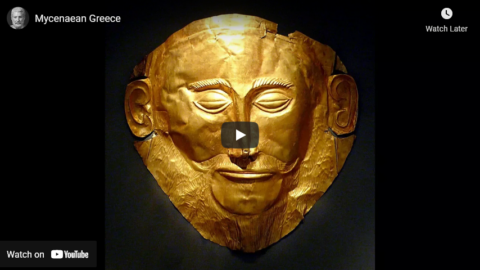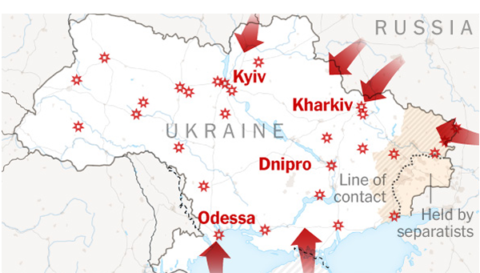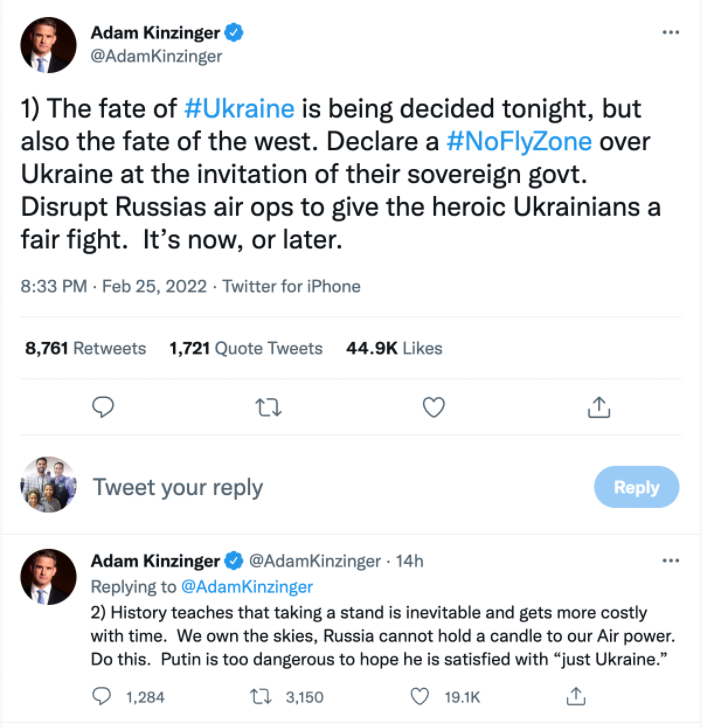TimeGhost History
Published 28 Feb 2022What do you get when you combine vigorous grain-tax policies, bad harvests with Stalin’s fear and animosity for the rural population of Ukraine? A man-created murder famine, designed to kill millions of Ukrainian men, women and children.
(more…)
March 1, 2022
Genocide in Ukraine: The Holodomor | Into Context | War in Ukraine 01
One of the amazing features of Trudeau the lesser’s reign has been the Liberal Party’s abandonment of Canadian nationalism
In The Line, Andrew Potter points out an interesting historical quirk where Canadian practice has long been at odds with most other western democracies:
On social media, it was common to see people lamenting this co-optation of the Canadian flag, with some wondering if it was even acceptable to fly the flag any more.
The reason this has been so disconcerting for so many is that a long-standing feature of the Canadian political landscape has been that the nationalists were predominantly on the left. As the author Stephen Henighan noted years ago in his essay “Free Trade Fiction”, this made Canada close to unique among industrialized, developed countries in the West, where the nationalists tend to be on the right. Left-wing nationalism is typically a feature of post-colonial states, where the fight for independence or liberation from colonial oppressors gets wrapped up into a nationalist narrative.
The reason left-wing nationalism has been so appealing to Canadians was precisely because of our weak identity and ongoing concerns over assimilation, first into the British empire, then later into the American continentalist project. If there’s a founding document of this tendency it is Margaret Atwood’s Survival, but it is prefigured by books like George Grant’s Lament for a Nation and finds its popular expression in everything from Heritage Minutes to the famous Joe Canada ad for Molson beer.
The left-wing focus of Canadian nationalism held sway from the end of the Second World War until about five years ago, and it was hugely consequential for Canadian politics. Most obviously, it helped establish the Liberals as the natural governing party. By making support for Liberal policies synonymous with defending Canadian independence, and by treating Liberal values as Canadian values, the Liberals were able to effectively frame their conservative opponents as un-Canadian.
On the continental policy front, it served to place a pretty clear barrier to deep political integration with the United States. In a 2005 essay that looked at the prospects for political co-operation between Paul Martin’s Liberals and George W. Bush’s Republicans, Joe Heath noted that the big obstacle to Canadian participation on things like Ballistic Missile Defence was the fact there was virtually no ideological overlap between nationalist groups in Canada and the U.S.
[…]
Today, things have completely reversed. A major catalyst for this shift was the decision by Justin Trudeau, when he came to power in 2015, to make denigrating Canada central to his Liberalism. It began when he started issuing formal apologies for past wrongs, at an unprecedented rate for Canadian federal governments. Then there was his acceptance of one of the findings of the National Inquiry into Missing and Murdered Indigenous Women and Girls, that Canada committed genocide against Indigenous peoples. Then there was his decision last spring to order all federal flags to fly at half-mast after the reports of the unmarked graves of hundreds of Indigenous children who died while in the supposed care of the residential school system. The flags remained lowered for months, until pressure from veterans groups and the approach of Remembrance Day forced his hand and he ordered the flags raised.
Whatever the merits of any of these initiatives taken on their own, taken as a whole they set a recurring tone from the government, that Canadians were a fallen people. There is no question that dumping on Canada is a deliberate strategy for the Trudeau Liberals. What is less clear is whether, in persuading Canadian leftists to dislike their country, the prime minister realizes the forces he has unleashed in the process.
Mycenaean Greece
Thersites the Historian
Published 25 Jan 2018In this video, I look at the Mycenaean civilization in Greece, which lasted from 1600-1100 BCE.
Words of the day — “tribalism, jingoism and emotionalism”
Glenn Greenwald on the war propaganda being pushed by both sides in the Russian-Ukrainian conflict, and how after two full years of “war on Wuhan Coronavirus propaganda”, we’re seeing a smooth transition to more traditional war propaganda from our governments and media:
In the weeks leading up to the Russian invasion of Ukraine, those warning of the possible dangers of U.S. involvement were assured that such concerns were baseless. The prevailing line insisted that nobody in Washington is even considering let alone advocating that the U.S. become militarily involved in a conflict with Russia. That the concern was based not on the belief that the U.S. would actively seek such a war, but rather on the oft-unintended consequences of being swamped with war propaganda and the high levels of tribalism, jingoism and emotionalism that accompany it, was ignored. It did not matter how many wars one could point to in history that began unintentionally, with unchecked, dangerous tensions spiraling out of control. Anyone warning of this obviously dangerous possibility was met with the “straw man” cliché: you are arguing against a position that literally nobody in D.C. is defending.
Less than a week into this war, that can no longer be said. One of the media’s most beloved members of Congress, Rep. Adam Kinzinger (R-IL), on Friday explicitly and emphatically urged that the U.S. military be deployed to Ukraine to establish a “no-fly zone” — i.e., American soldiers would order Russia not to enter Ukrainian airspace and would directly attack any Russian jets or other military units which disobeyed. That would, by definition and design, immediately ensure that the two countries with by far the planet’s largest nuclear stockpiles would be fighting one another, all over Ukraine.
Kinzinger’s fantasy that Russia would instantly obey U.S. orders due to rational calculations is directly at odds with all the prevailing narratives about Putin having now become an irrational madman who has taken leave of his senses — not just metaphorically but medically — and is prepared to risk everything for conquest and legacy. This was not the first time such a deranged proposal has been raised; days before Kinzinger unveiled his plan, a reporter asked Pentagon spokesman John Kirby why Biden has thus far refused this confrontational posture. The Brookings Institution’s Ben Wittes on Sunday demanded: “Regime change: Russia”. The President of the Council on Foreign Relations, Richard Haass, celebrated that “now the conversation has shifted to include the possibility of desired regime change in Russia.”
Having the U.S. risk global nuclear annihilation over Ukraine is an indescribably insane view, as one realizes upon a few seconds of sober reflection. We had a reminder of that Sunday morning when “Putin ordered his nuclear forces on high alert, reminding the world he has the power to use weapons of mass destruction, after complaining about the West’s response to his invasion of Ukraine” — but it is completely unsurprising that it is already being suggested.
In the reporting and opining on the conflict in Ukraine, Mark Steyn says the frequent rhetorical invocation of Neville Chamberlain in 1938 are unfair:
Which brings us to this last day of February 2022. Which is beginning to feel like late February 2020, don’t you think? That is, in the stampede to impose the suffocating blanket of “the narrative” to the exclusion of all else. There is certainly a real country called Ukraine, where real people are being killed by real missiles hitting their apartment houses. Just as there was a real virus called Covid-19, which emerged from a real lab in a real city in China and began killing real people all over the world. Yet “the narrative”, then as now, seems designed to obscure any serious consideration of the underlying causes.
Nevertheless, certain things should be capable of being grasped even by viewers of CNN and readers of The New York Times. Just as Covid revealed that China is now the planet’s dominant economic power, so Ukraine confirms that America’s post-Cold War unipolar moment is dead: over the weekend, the talk shifted (again very Corona-like) from fifteen days to flatten the Tsar to an acceptance that this is a long-term thing — that, for a while at least, “a gas station masquerading as a country” (in John McCain’s characteristically stupid sneer) has succeeded in rolling back the great European liberations of three decades ago.
These days Neville Chamberlain is too invoked and the comparison is unfair. In 1938, when Germany invaded Czechoslovakia, the Prime Minister went on the radio and described it as “a quarrel in a far-away country between people of whom we know nothing”. For America, Russia’s invasion of Ukraine is the precise opposite: a quarrel in a far-away country of which their leaders know everything. Because they’ve been up to their neck in it for years.
Ukraine is a beautiful place, its people are intelligent and agreeable, and its women are stunners. But it is a very poor country and, notwithstanding its many fine qualities, the most corrupt nation in Europe, and, per Ernst & Young, the ninth most corrupt in the world. As I pointed out regularly three years ago on Tucker and Rush, at a time when Hunter Biden was getting fifty grand a month plus seven-figure bonuses from Burisma, the average wage in Ukraine was $200 a month: The Biden family’s heist was “not a victimless crime”.
A far-away country of which we know nothing? Has there been any Washington scandal that has not involved Ukraine in recent years?
The Trump impeachments? Ooh, he telephoned … Ukraine!The “Russia investigation”? Putin wanted Trump to win why exactly? Oh, no problem: because he’ll roll back sanctions imposed for Moscow’s actions against … Ukraine!
Do we have any witnesses to any of this? Yeah, sure, the really good guy’s some Colonel Vindman. He’s an immigrant from … Ukraine!
On the other hand, Obama made Biden his point-man in … Ukraine!
Biden told the Ukrainians they had to clean up all the corruption. They took the hint and put Hunter on the board, and Joe, Jim and the rest of the mob family suddenly acquired extensive “business interests” in Ukraine.
Oh, and the biggest source of foreign donations to the Clinton Foundation is … Ukraine.
What was lost when the Library of Alexandria burned?
Kings and Generals
Published 18 Nov 2021⚔️Myth of Empires is out in Early Access on Steam, check it out and make sure to wishlist it https://click.fan/KingsGenerals-MoE
Kings and Generals’ historical animated documentary series on the history of Ancient Civilizations and Ancient Greece continue with a video on the Library of Alexandria, as we ask what was lost when the library burned.
Support us on Patreon: http://www.patreon.com/KingsandGenerals or Paypal: http://paypal.me/kingsandgenerals … We are grateful to our patrons and sponsors, who made this video possible: https://docs.google.com/document/d/1o…
The video was made by animator Waily Romero and illustrator Simone González, while the script was researched and written by David Muncan. This video was narrated by Officially Devin (https://www.youtube.com/user/OfficiallyDevin).
✔ Merch store ► teespring.com/stores/kingsandgenerals
✔ Podcast ► Google Play: http://bit.ly/2QDF7y0 iTunes: https://apple.co/2QTuMNG
✔ Twitter ► https://twitter.com/KingsGenerals
✔ Instagram ► http://www.instagram.com/Kings_GeneralsProduction Music courtesy of EpidemicSound
#Documentary #AncientGreece #Alexandria
QotD: The Great Library of Alexandria
… we don’t know exactly who founded the Library and we aren’t clear on precisely when. What is clear is that it was quite early in the history of what was to become the great city of Alexandria and that its establishment made the city a centre of learning for centuries to come. What should also be made clear, however, is that it was not actually a “library” that was established at all. The “Great Library” that we refer to was a collection of books associated with a religious shrine – the Musaeum or Mouseion. This institution was, as the name implies, dedicated to the Nine Muses: Clio (history), Urania (astronomy), Calliope (epic poetry and song), Euterpe (lyric song), Polyhymnia (sacred song), Erato (erotic song), Melpomene (tragedy), Thalia (comedy) and Terpsichore (dance). The temple to the Muses had a dedicated priest appointed by the Ptolemaic kings and was the centre of a complex that included an exhedra, or hall, with recesses and seats for lectures and private study. According to the only and rather brief surviving description, given by Strabo in the early first century AD, it also included a communal dining hall with kitchens, a dormitory and other residential apartments, extensive gardens decorated with statues and a shaded walk. What we call the “Great Library” was a collection of books gathered to service the scholars who were housed and worked in the Mouseion and it was stored partially in the complex itself and, later, on other sites including at least three “daughter libraries”. The popular image of the Great Library as an echoing hall lined with shelves of scrolls with desks and tables for scholars is almost certainly inaccurate. That kind of library, which is still the model for many traditionally-styled libraries today, was developed much later by the Romans and the Mouseion would instead have had “a colonnade with a line-up of rooms behind … the rooms would serve for shelving the holdings and the colonnade provide space for the readers.” (Lionel Casson, Libraries of the Ancient World, Yale University Press, 2001, p. 34)
The Mouseion at Alexandria was far from the only shrine to the Muses in the ancient world, nor was it the only one with an associated centre of study. Pythogoras had recommended the establishment of a shrine to the Muses for the promotion of learning on his first arrival on Croton, for example and the Seleucid kings built one at Antioch in the late second century BC, with an attendant centre for study and a library. The fact that the Great Library was actually associated with a religious shrine is something that is ignored or glossed over in many modern accounts. [Carl] Sagan […] mentions about how one of the “daughter libraries” was the Serapeum, which was the temple of Serapis, but he skips around this in a rather gingerly manner. He says the Serapeum was “once a temple, but was later reconsecrated to knowledge”. This is nonsense. The Serapeum was always a temple and was not “reconsecrated” to anything. Libraries were often established as adjuncts to temples but it seems Sagan was attempting to distance the “annex” of the Great Library from the temple in which it sat because this did not quite fit his theme of secular knowledge’s superiority to “mysticism”. Like the Serapeum, the Mouseion was a temple with a research institution and a book collection associated with it.
This aside, the Mouseion really was primarily a research institution and its associated book collection – which we will continue to refer to by the shorthand expression the “Great Library” – was clearly one of if not the most extensive in the ancient world (more on that below). Many famous ancient scholars worked in the Mouseion, including Eratosthenes and probably Ptolemy. But several who are often claimed as working there (or even as being “librarians” of the Great Library, no less) clearly did not. Sagan’s hymn of praise says that Hipparchus studied there, but he seems to have only used some of the books from the collection and there is no evidence he ever even visited from his home on Rhodes. Likewise Sagan says Archimedes worked there, but there is no clear evidence for this and what little we know of Archimedes’ life indicates he spent it in Syracuse. Of the others Sagan mentions, Euclid and Herophilos may have studied there, depending on when the Mouseion was established and Dionysius of Thrace is another maybe, though more likely. On the whole, Sagan’s roll call of great scholars is mainly hyperbole and speculation rather than historical fact. The other figure who is regularly invoked as being associated with the Great Library, and even presented as its “last librarian”, is (again) Hypatia. This is despite the fact that both the Great Library and its daughter library in the Serapeum had ceased to exist by her time.
Tim O’Neill, “The Great Myths 5: The Destruction Of The Great Library Of Alexandria”, History for Atheists, 2017-07-02.








